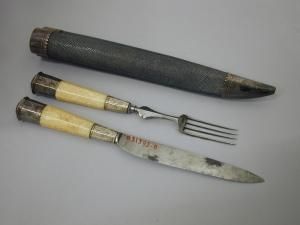Annotation:Three Case Knives
X:11 T:3 Case knifes T:Three Case Knifes M:3/2 L:1/4 Q:1/2=100 S:D.Wright, Extraordinary Collection, London 1713 Z:Pete Stewart, 2004 <www.hornpipemusic.co.uk> K:G "Time sig. 6/4 in book"ga/g/fg/f/ e/f/g/e/|gd2fed|cd/c/B c/B/ G/A/B/c/|AG2BAG|| G/A/B/c/dGF2|EA2GFE/D/|G/A/B/c/dGF2|DG2BAG|| L:1/8 GBdB GBdB F4|E2A4G2F2ED|GBdB GBdB F4|D2G4D2B,2A,G,|]
THREE CASE KNIVES. AKA and see “Jock and Tam,” “Lady Susan Montgomery's Hornpipe,” “Punchinello (1),” “Rusty Gulley (2),” “Three Sharp Knives,” “Three Rusty Swords.” English, Triple Hornpipe (6/4 time). G Major. Standard tuning (fiddle). AB (Offord): AABB (Atkinson, Barber): ABC (Wright). The melody (as "3 Case knifes") was published by London publisher Daniel Wright in his An Extraordinary Collection of Pleasant and merry Humour's never before Published, Containing Hornpipes, Jiggs, North Cuntry Frisks', Morris's, Bagpipe Hornpipe's, & Round's with Severall Additonal fancis added, fit for all those that play Publick (London, c. 1715). The melody was earlier entered into the 1694-95 music manuscript collection of Northumbrian musician Henry Atkinson [1] as "Three Sharp Knives," with parts reversed from Wright's. The tune was popular under various titles: London music publisher John Walsh called it "Punchinello's Hornpipe, or Three Rusty Swords".

See also the related “Forks and Knives” and “Jack's Gone a-Shearing.” See note for "annotation:Knives and Forks" for explanation of the "Case Knives" title.

